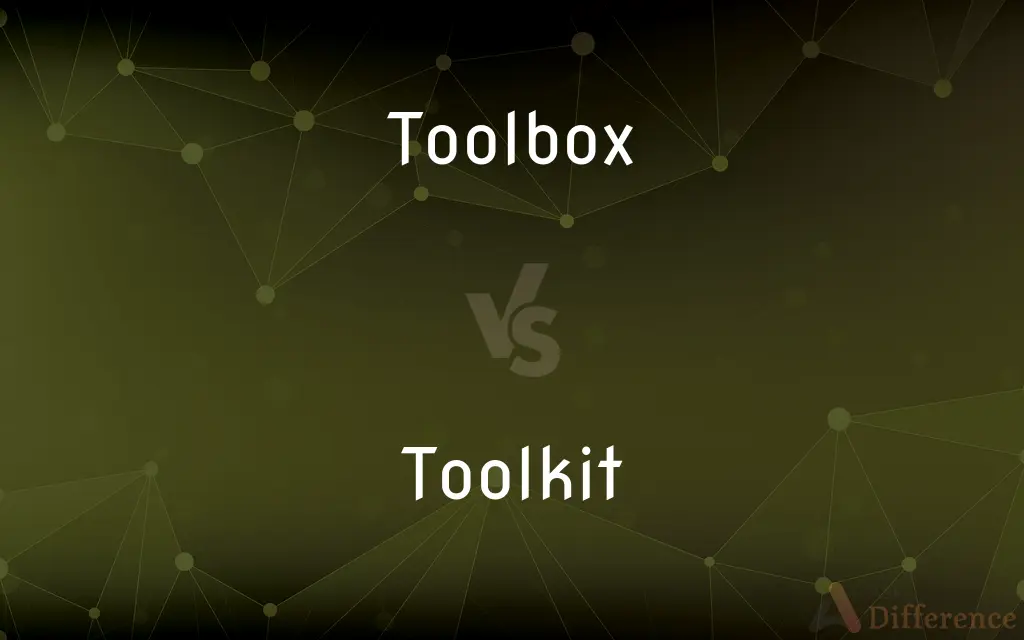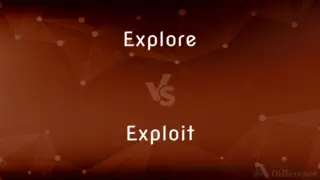Toolbox vs. Toolkit — What's the Difference?
By Tayyaba Rehman & Maham Liaqat — Updated on March 28, 2024
A toolbox is a physical container for tools, while a toolkit refers to a set of tools for a specific task, not limited to physical form.

Difference Between Toolbox and Toolkit
Table of Contents
ADVERTISEMENT
Key Differences
A toolbox is traditionally a physical case or container used to organize, carry, and protect various tools. It can be made of metal, plastic, or wood and is designed to be durable and portable. Toolboxes are commonly used in professions like carpentry, mechanics, and electrical work, where a variety of hand tools are required. On the other hand, a toolkit can refer to both physical sets of tools and metaphorical or digital collections of resources or skills needed for specific tasks. For example, a software development toolkit (SDK) includes libraries, development tools, and documentation to create applications.
While a toolbox is essential for storing and transporting physical tools safely, ensuring they are readily available when needed, a toolkit emphasizes the functionality and application of the tools it comprises. A toolkit for a specific task, such as bike repair, might include a set of wrenches, tire levers, and a patch kit, which could be stored in a toolbox or a bag designed for easy access during repairs.
The concept of a toolkit extends beyond the physical realm, especially in professional and academic fields. For instance, a researcher’s toolkit may include software programs, databases, and methodologies crucial for conducting studies. Similarly, the term is used in the digital world, where toolkits provide a suite of tools designed to accomplish specific tasks, such as a graphic design toolkit including software like Photoshop, Illustrator, and InDesign.
The choice between a toolbox and a toolkit depends on the context. For physical tasks requiring manual tools, a durable toolbox is invaluable for organization and transport. Conversely, when referring to a collection of skills, resources, or digital tools designed for a particular purpose, the term toolkit is more appropriate. Both concepts underline the importance of having the right resources at hand, whether for building a house, repairing a device, or developing software.
Choosing the right toolbox or toolkit is crucial for efficiency and effectiveness in any task. A well-organized toolbox can save time and frustration in finding the right tool, while a comprehensive toolkit ensures that all necessary resources are available for a specific project or job. As the distinction between physical and digital toolsets becomes increasingly blurred in many professions, the significance of both toolboxes and toolkits continues to grow.
ADVERTISEMENT
Comparison Chart
Form
Physical container for storing tools.
Can be a physical set of tools or a collection of resources, skills, or software.
Function
Used to organize, carry, and protect tools.
Refers to the tools or resources needed for a specific task.
Usage Context
Common in manual professions like carpentry, mechanics.
Used in a wide range of contexts, including professional, academic, and digital fields.
Composition
Primarily consists of hand tools.
Can include physical tools, software, methodologies, or skills.
Objective
Focuses on storage and transportation.
Emphasizes functionality and application in specific tasks.
Compare with Definitions
Toolbox
Essential for professionals requiring a variety of hand tools.
Electricians use toolboxes to manage their wire cutters, pliers, and screwdrivers.
Toolkit
Can be physical, digital, or a collection of skills.
A project manager's toolkit might include negotiation skills and project management software.
Toolbox
Can be portable or fixed in a workshop.
Mechanics might have a large, fixed toolbox in the garage for all their equipment.
Toolkit
Refers to a set of tools or resources for a specific task.
A graphic designer's toolkit includes software like Adobe Illustrator.
Toolbox
A physical container for organizing and transporting tools.
Carpenters carry a toolbox to keep their hammers, saws, and nails organized.
Toolkit
Varies widely across different professions and activities.
A software developer's toolkit includes different programming languages and development environments.
Toolbox
Toolboxes are made from durable materials like metal or plastic.
A metal toolbox can withstand rough handling at construction sites.
Toolkit
Focused on achieving specific objectives efficiently.
An SEO toolkit contains tools for keyword research, analytics, and content optimization.
Toolbox
Designed for practicality and ease of access to tools.
Some toolboxes feature drawers and compartments for better organization.
Toolkit
Emphasizes functionality and application over form.
A bike repair toolkit consists of tools specifically chosen for on-the-go repairs.
Toolbox
A toolbox (also called toolkit, tool chest or workbox) is a box to organize, carry, and protect the owner's tools. They could be used for trade, a hobby or DIY, and their contents vary with the craft.
Toolkit
A set of tools, usually in a single container.
Toolbox
A case for carrying or storing tools.
Toolkit
(Computers) A collection of software routines that together serve a specific purpose, such as modifying an existing program.
Toolbox
(Computers) A set of precompiled routines for use in writing new programs.
Toolkit
A collection of documents, such as informational summaries and form letters, that one, especially an adviser or instructor, uses to inform others about a topic of interest.
Toolbox
A storage case for tools.
Toolkit
A set of tools kept together, especially comprising all the tools suitable for some particular type of work.
Toolbox
(computing) A set of pre-existing routines for use in writing new programs.
Toolkit
(by extension) A set of personal abilities, skills, or resources to draw on.
Toolbox
(figurative) A set of skills or competences
Toolkit
(computing) A set of software tools or components.
Toolbox
(slang) Dumbass or idiot.
Toolkit
A set of guidelines or instructions.
Toolbox
A box or chest or cabinet for holding hand tools
Toolkit
Instructions to organise a protest.
Common Curiosities
Why is a toolbox important for professionals?
A toolbox is essential for professionals to efficiently organize and protect their tools, ensuring they are readily accessible when needed.
What is a toolbox?
A toolbox is a physical container designed to store, organize, and transport tools.
What is a toolkit?
A toolkit refers to a set of tools, resources, or skills tailored for specific tasks or projects.
How does a toolkit differ from a toolbox?
While a toolbox is a physical container for tools, a toolkit encompasses a broader range of tools, skills, or resources for specific applications, not limited to physical items.
Can a toolbox also be considered a toolkit?
In a broad sense, a toolbox could be considered a type of toolkit if it contains a curated set of tools for specific tasks. However, "toolkit" has a broader application, extending beyond physical tools.
Can a toolkit be digital?
Yes, a toolkit can be digital, such as a software development kit (SDK) that includes various programming tools and libraries.
What might be included in a carpenter's toolbox?
A carpenter's toolbox typically includes hammers, saws, measuring tapes, and various hand tools.
Is a toolkit always physical?
No, a toolkit can be non-physical, comprising digital tools, software, or even a set of skills relevant to a particular field or task.
What could be part of a digital marketer's toolkit?
A digital marketer's toolkit might include SEO tools, social media management platforms, and analytics software.
How do professionals choose what goes into their toolkit?
Professionals select tools based on their specific needs, the tasks at hand, and the efficiency and effectiveness of the tools in achieving their objectives.
Share Your Discovery

Previous Comparison
Explore vs. Exploit
Next Comparison
Municipality vs. TownshipAuthor Spotlight
Written by
Tayyaba RehmanTayyaba Rehman is a distinguished writer, currently serving as a primary contributor to askdifference.com. As a researcher in semantics and etymology, Tayyaba's passion for the complexity of languages and their distinctions has found a perfect home on the platform. Tayyaba delves into the intricacies of language, distinguishing between commonly confused words and phrases, thereby providing clarity for readers worldwide.
Co-written by
Maham Liaqat















































